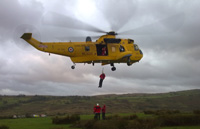General info > Getting started > Calling for help
Calling for help
In most areas of Britain there will be a search and rescue team willing to come out and help if you get into difficulties. The teams consist solely of volunteers, so there's no charge for being rescued (abroad you should make sure you have suitable insurance because a helicopter evacuation could be very expensive indeed). By the same token rescue volunteers have jobs and families, so it's worth pausing for moment to consider if you can get yourself out of the predicament. If the answer is 'no' then don't delay in getting help (especially if it's about to get dark).
What the rescue services need to know:
Your location (a grid reference if you have one or as much information as you can give about where you are and how you got there)
The nature of the predicament or casualty
The number of people in the party
What clothing and equipment you and your party have
Any medical conditions you know about (e.g. if the casualty is diabetic)
If you can use a mobile phone then make a call with this information. If you cannot you may need to send someone down to raise the alarm. If possible send two people to do this, with at least one remaining with the casualty. If there is a larger party and just one or two casualties you should consider how many need to remain to help - it can get very cold sitting around.
Mobile phones
It is well worth carrying your mobile phone when out walking just in case you need to make an emergency call, but bear in mind that in remote areas you may not be able to get reception. If you can't get reception your best bet may be to walk uphill for a while - it may just bring you into range of one of your network provider's masts. Call 999 and ask for Police (on the coast for Coastguard). The police will ask for assistance from Mountain Rescue if they need it.
112 will place an emergency call anywhere in the world, including in the UK.
Under a new agreement between mobile operators you may be able dial 999 and, even if you have no network coverage from your provider, if there is another provider you will be connected. Note however that while you can call 999 out, emergency services will not be able to call you back. So make sure you give full information on your situation and location during the first call. You will still have to try and find a place with your own network coverage if you want emergency services to be able to call you back, perhaps so you can give a update on your situation.
If other members of your party have mobile phones it's a good idea to switch some of them off to conserve battery life and then use them as required.
Helicopters
 It's just possible that an RAF helicopter or air ambulance will arrive before a rescue team on foot. If you see a helicopter approaching get someone to stand with their arms wide apart upwind of a spot where you think they may be able to land. The crew will be looking for someone doing this rather than people waving. At night don't shine torches at the approaching helicopter - it will blind the pilot who is likely to be using a night sight. The dull glow from a mobile phone screen waved gently from side to side is apparently ideal and can be seen from miles away.
It's just possible that an RAF helicopter or air ambulance will arrive before a rescue team on foot. If you see a helicopter approaching get someone to stand with their arms wide apart upwind of a spot where you think they may be able to land. The crew will be looking for someone doing this rather than people waving. At night don't shine torches at the approaching helicopter - it will blind the pilot who is likely to be using a night sight. The dull glow from a mobile phone screen waved gently from side to side is apparently ideal and can be seen from miles away.
Donations
Rescue teams are entirely funded by voluntary contributions. It costs a lot of money to maintain vehicles, train members and keep medical supplies up to date. If you see a collection box in a pub or shop please pop a few coins in (or even a note!). You can also support the main organisation for teams in England and Wales by joining their Basecamp scheme, which is just £24 a year.
To find out more about how to prepare for a safe day out, check out Kirkby Stephen Mountain Rescue Team's Safe in the Hills website. It's packed with useful information on all aspects of hill walking, plus you can learn more about how a rescue team operates.